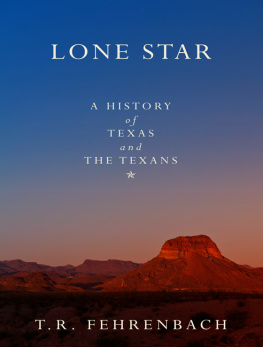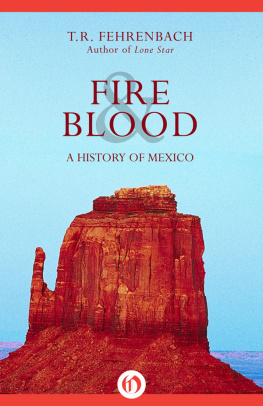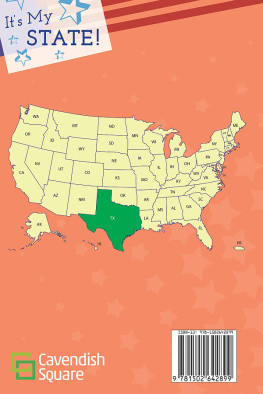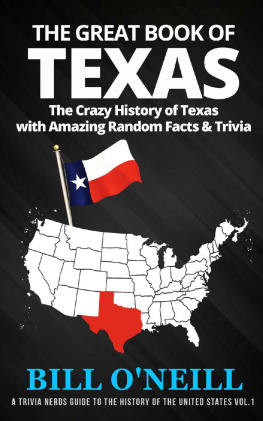Seven Keys to Texas
T.R. Fehrenbach

FOREWORD TO THE REVISED EDITION
During the 150th year of Texan Independence, many non-Texans have asked, why have Texans made this anniversary such a big occasion?
After all, other states have had their centennials and sesquicentennials of statehood, and many are much older in terms of settlement and entry into the Union.
The answer, of course, is in the title of the Texas Sesquicentennial itself: The Texas Sesquicentennial of 1986 does not mark Texas 150th birthday as a state but the anniversary of the Texas Declaration of Independenceit is a celebration of the fact that Texans declared their freedom from distant, arbitrary government, fought the issue on the battlefield, and made it stick. And for nearly ten years afterward, spurned by the United States and constantly threatened by Mexico, Texans maintained a stubborn sovereignty all alone, symbolized by its red, white, and blue banner emblazoned with a single star.
No other American state can boast that history; no other American state defeated a foreign power, put its flag on the high seas, was recognized as a sovereign nation by European powers, or came voluntarily into the United States as an independent country. After all, the first American independence was declared and fought by a bakers dozen of British colonies, whose united population numbered ten times that of Texas in 1836.
This points up, though it is only part of the reason, the fact that there is something different and special about Texas and Texans, just as there is something special about Israel and Jews, or France and Frenchmen.
Texans, like Frenchmen and Israelis, have suffered history upon their own soil.
Although it is the largest territorially of the lower and historic forty-eight, Texas after all is only one state in a huge American nation. But its boundaries enclose something more than a mere administrative unit of the United Stateswhich is the way many Americans actually see their states. Texas from the first has been a state of heart and mind. This may not be an entirely rational state, but then there is not much rational about being French or Jewish or belonging to any other people. Such senses of identity spring from the chemistry of blood and soil, of history and culture.
Texas has a true history, and it is much more than a mere record of economic development.
This is what this book is about. It is not of facts or figures about Texas, or Texas trivia, or an apology for the state. Nor is it Texas folklore or Texas brag. A full and growing literature of all those things exists elsewhere. This is a book about the chemistry of history as it worked in the giant crucible of Texas and an attempt to understand and explain the origins and causes of much of present Texas reality.
No one denies that there is a true Texas mystique. However, the origins of this are often obscure to other Americans. The notion that there may be a Texan ethnicity offends some Americans who can accept and admire almost any form of ethnicity except the Old American steeped in a sense of territorialitywhich of course is a form of discrimination. But there is a sort of Texan ethnicity, American to the core, American in its origins, American in its intense patriotism, though in some ways divergent from the American mainstream. And at the same time that Texas is constantly changing under the influence and pressures of American society and government, Texans are also influencing and shaping the nation as a whole.
Some Americans happen to be Texans in much the same way that some Britons are Scots and some Germans, Bavarians. While the contrasts are not as deep, and while Texans have been caught up in the same flaccid commercial cosmopolitanism that pervades America from coast to coast and like Scots and Bavarians swallowed up in a greater nation-state and culture, like Scots and Bavarians they have retained an essential identity.
Texans, in fact, have occupied something of the position of Scots within the British Empire: provincials who have provided frontiersmen, soldiers, entrepreneurs, and adept politicians to the greater society while remaining basically provincial. A Texan who goes to Washington or New York may make his mark on the nation, but he remains a Texan. And like Scots, Texans have been both admired for their qualities and detested as barbarians.
Today, this is important beyond the parochial concerns of historians and cultural anthropologists. Texas has always engaged the nations, and in some sense, the worlds, imagination, from the Alamo and the embattled Republic to the Cattle Kingdom and trail drives, from the Indian wars to the raw scent of crude oil at Spindletop. Hollywood from the first made Texas a favorite locale and theme. However, what was once colorful and heroic but only the prospect of an empire has now become an American empire indeed. Texas is one of a handful of truly imperial states, whose society, economy, population, resources, politics, and wealth increasingly decide the destinies of the entire American nation.
Texas is too important to be regarded or dismissed as quaint, provincial, or perverse.
In recent years Texas has grown at three times the national rate, and in Texas what has been called the American Dream has never died.
Americans tend to be present-minded and problem-oriented, impatient with the past, and like Henry Ford think history is bunk. But those who dismiss history will not be able to comprehend the present reality of Texas and Texans. They may even make the cardinal error of expecting them to be or act just like New Yorkers or Montanans.
The most important keys to understanding Texans, that majority which directs the economy and culture of the state, are historical perspectives. No one would try to understand Israel without some insight into the history of the Jewsand no one should try to understand Texas without some knowledge of its past.
I have used these perspectives to try to explain the present, and since history is a continuing process, perhaps shed some light on the future.
I hope they will prove useful to outsiders, newcomers, and for that matter, to some Texans, too.
Since the first, 1983, edition of Seven Keys, appeared, there have been changes in Texas, but most of these really follow the patterns of the past. The oil bust of 1981-82, followed by the severe local downturn of 1982-83, the slowing of the real estate boom and flattening of in-migration, only repeat old Texas cycles on a grander scale. Statistics have been updated, where available, and projections adjusted accordingly.
T.R.F., January, 1986
I
THE PEOPLE
Texas is a complex state, sprawling across at least five distinct geographical regions with different economies and lifestyles, and it contains every sort of people and subculture.
Texas is far less homogeneous than its image. One third of all Texans are members of minority groups as these are now defined. In 1980, the state ranked second behind California in its number of Hispanics, second in the concentration of Vietnamese, third in black population, and ninth in American Indians.
Texas is twelve percent black, a percentage that is declining. It is twenty-one percent Hispanic, representing a mostly Mexican twentieth-century immigration that is in no sense assimilated. The proportion of Hispanics has risen rapidly, due both to high birth rates and continuing immigration over the past decade. Black population tends to be concentrated in the southeast or north central regions, primarily in the Houston and Dallas-Ft. Worth metropolitan areas. Mexican-Americans remain along the border and Gulf coast, and more than half live in south-central Texas. In the national pattern, more than eighty percent of all non-whites are in metropolitan areas, with the great majority dwelling in the central cities, whether Houston, Dallas, or San Antonio.









